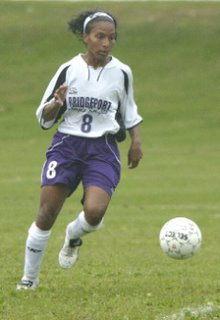OK I'm back, I am supposed to be doing homework but here I am. Lime would really appreciate this one:
This post has been long in coming and now that I’ve spent a few weeks at home and truly "gotten back into it" although I have relatives here to talk to, I realise I just LOVE the Trini language. This has also been helped in large part by reading other trini blogs and finding amusement in how people write and express themselves in a way that no other would understand.
I’ve frequently gotten into discussions/arguments with people (sometimes Jamaicans) about the fact that Trinis speak their own language and not just a dialect or broken English as some would like us to believe. Yes most of the WORDS are English, but many are not, and certainly our expressions are not. And yes there is a set structure, which makes it indeed a language of its own; everybody says things in the same format, its not broken English helter skelter like we don’t know the right thing to say.
How many times have we switched from speaking “properly” to speaking “dialect”? Its unfortunate that we have developed this concept of what is proper and what is not as opposed to which language should be used in which situations. I would like to reference a most interesting text written by Merle Hodge, “The Knots in English”, which expounds on the fact that "the majority of us are not English-speaking; we are a Creole-speaking. We have a language of our own and English is another language we have to learn." The text touches on the circumstances around which we grow up and learn to speak and our trouble with learning English. It outlines very specific examples of structure of Trinidad Creole and contrasts it with Jamaican Creole (we all know that we DO NOT talk the same) in a way that you can clearly see how we use certain words, and frame thoughts and sentences. Most enlightening reading about something you take for granted e.g.
"Double Negatives : Creole is one of those languages which uses more than one negative marker at a time...this cannot be done in English.
English - I DON'T want any. NOBODY here smokes any weed.
Trini - I DON'T want NONE. NOBODY here DOESN'T smoke NO weed.
Jamaican - Me NO want NONE. NOBODY here NO smoke NO weed.
In English a negative sentence can only have one negative marker"
Quite an interesting text containing examples, comparisons, and explanations about different parts of sentence structure and how "we" would say things. It is quite comprehensive in its own right but doesn't/cannot get into the intricacies of "nah", "eh heh" and "eh eh" LOL. I wholeheartedly subscribe to one statement from the preface that "it is hoped that Caribbean users [of the text] will gain a greater respect for their mother tongue as a language in its own right."
Till nex time...
Thursday, January 18, 2007
Subscribe to:
Post Comments (Atom)

5 comments:
gyul, yuh real speakin de truth!
and i think my trini creds go up in that i can tell the difference between a jamaican speaking and a trini speaking and i get kind of pedantic in correcting americans who come at me with 'irie, mon!' when i mention trinidad.
gyul, i feelin fuh more on dis trini ting yuh talkin bout....
oh, and i did do an audio post back in i think jan '06 where i read something in trini. if you want to hear...
Good stuff, thanks for posting. Everyone needs to know the difference.
Rep Yuh Culture!
www.IZATRINI.com
Lime the audio was mad funny. I already have a follow-up post in mind. I hope it'll be a good american/trini comparison
You may already know this one: Cote Ce Cote La--A Dictionary of Trinidad & Tobago
I cannot remember the author, but it's a fun book.
I don't know much about the Jamaican argument. To me "creole" has always simply been a perversion of English. Then again, I am not a linguist.
YEs I am familiar with Cote-ce cote-la. Always wanted to get a copy...
On your point of not being a linguist, I think I'll follow up with a little about creoles and distinguishing languages
Post a Comment